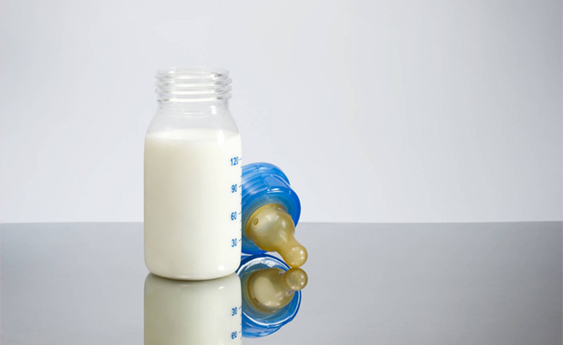BREASTFEEDING
"Breast Milk Sharing" Still Needs to Be Treated with Caution
In recent years, with the benefits of breastfeeding being recognized by many people, the demand for breastfeeding has been increasing. However, since some mothers are unable to breastfeed for various reasons, in order to meet the needs of this group of people, "breast milk sharing" came into being. Although breast milk sharing allows a certain group of people who are incapable of breastfeeding to breastfeed, the safety of sharing breast milk is worthy of investigation.
Breast Milk Sharing Is in Line With the Needs of the Times
With the in-depth research and application of breastfeeding, scientists have found many benefits and therapeutic effects of breast milk, which have been increasingly used in the treatment of clinically ill children. To meet the needs of clinical applications, large-scale breast milk storerooms began to rise. In 1909, the world’s first breast milk storehouse was established in Vienna, Austria, marking the official arrival of the era of "breast milk sharing".
Why is there a "private" trade in breast milk?
In recent years, with the vigorous promotion of breastfeeding, more people understand the benefits and the significance of breast milk. Breast milk is not only easy to absorb, but also easy to provide better nutrition for the baby and contains immune ingredients that can enhance the immunity of child. Even other people’s breast milk can play a supplementary therapeutic role.
Some studies have shown that breastfeeding the low birth weight preterm infants can significantly reduce the incidence of necrotizing enterocolitis and dyspepsia, and the average time of complete enteral nutrition and the average hospitalization time of preterm infants. These effects are very similar to those of mother’s breast milk [1]. As mothers have more understanding of such benefits, many mothers have a persistent pursuit of breastfeeding. When they are unable to breastfeed due to lack of milk or other reasons, they come up with the idea of "sharing".
However, breast milk in breast milk storehouse around the world is first supplied to hospitals for the auxiliary treatment of 0-1 year old babies with gastrointestinal diseases or hypoplasia, preterm infants, and critically ill babies and so on; thus, it is only available to the public when there is sufficient milk. The short supply of breast milk has many mothers began to obtain breast milk through relatives and friends, neighborhoods or Internet transactions, which led to the popularity of breast milk private transactions.
Breast Milk Sharing Entails Risks
Although private trading is widespread, this is not desirable. Firstly, breast milk provided in private and traded by individuals is informal and does not comply with the law. The Public Health England and the Food Standards Agency have warned against irregular breastfeeding practices for safety reasons.
Secondly, there is a lack of quality and safety guarantee in private transactions. If the mother does not pay attention to the hygiene in the process of milking, in the sucking device, and in the milk storage container, the breast milk from private transactions can cause bacterial contamination of breast milk. The ways of storing breast milk and timing have a direct influence on breast milk spoilage.
Furthermore, people who share breast milk generally do not perform a corresponding health check required for sharing breast milk, and even if they have the health certificate, the authenticity of the certificate is unreliable. In 2000, the Ministry of Health of P.R.China stated in the document Reply on Human Breast Milk Cannot Be Operated as a Commodity that human breast milk is not a general food resource and cannot be produced and operated as a commodity.
In contrast, breast milk from storehouse is relatively safe ways to use breast milk. Breast milk banks all over the country carry out rigorous screening tests to ensure the health of breast milk. For example, donors need to carry out health examination to eliminate the possibility of common infectious diseases; breast milk banks also require donors to have no bad living habits; have no history of drugs and blood transfusion in the past six months. The breast milk after meeting all the conditions mentioned above is finally pasteurized.
But even so, in fact, the absolute safety of breast milk cannot be guaranteed. First, the pre-donation examination can only identify common infectious diseases; other rare diseases and the incubation period of some infectious diseases cannot be ruled out. Second, the validity of donors’ healthy lifestyle is merely supported by their description, and there exist no standard tests to prove their description. Moreover, the milk composition of the same breast milk is not constant either. The milk composition is also changing according to different developmental stages of the infant to meet the different needs of the infant. Therefore, the breast milk of others may not be suitable for your child. To avoid unnecessary risks, breast milk from others should be considered under the advice of doctors.
Breastfeeding Should Be Provided According to Situations
Although breastfeeding is now pursued by many people, everything cannot be generalized. Of course, breast milk is the best choice, but pregnant mothers should not be too persistent in pursuing pure breast milk and should be well aware of baby’s conditions and their own conditions as well.
For mothers who are healthy but lack milk, it is recommended to try some prolactin methods. If breast milk is still inadequate, however, it is recommended to consider the infant formula mixed feeding as it is healthier and safer than sharing breast milk. If the child needs breast milk due to a physical illness, then you can consider feeding breast milk from the breast milk storehouse under the advice of doctor. After all, breast milk from private trading accompanies a number of risks so it is undesirable to seek or trade breast milk in private.
References
[1] Xiao Nirong, Liu Xihong, et al. Effects of feeding low-weight preterm infants with breast milk from breast milk storehouse on common complications [J], The Journal of Practical Medicine, 2018, 34 (10): 1735
